U.S. Embassy: Next Year in Jerusalem?
Campaign Promises Were Made, But Don’t Hold Your Breath
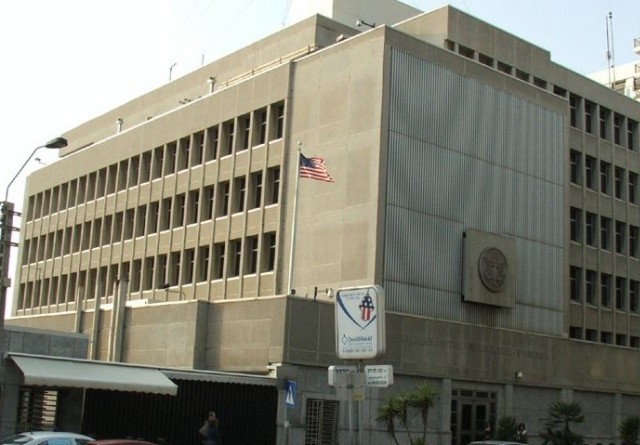
The Republican candidates made a lot of pledges to the record-breaking pro-Israel crowd at last week’s American Israel Public Affairs Committee (AIPAC) policy conference in Washington, D.C.
Among them was the promise that they’ll move the U.S. Embassy from Tel Aviv to Jerusalem.
So, if he becomes President, will Donald Trump, Ted Cruz or John Kasich move the American Embassy to Israel’s capital city?
Don’t count on it.
Promises, promises
Moving the embassy would break with over two decades of bipartisan White House policy to circumvent the Jerusalem Embassy Act of 1995, a law which mandates its relocation.
Congress passed the Jerusalem Embassy Act on October 23, 1995 by wide margins (93-5 in the Senate and 374-37 in the House). It called for Jerusalem to remain an “undivided city” and for the U.S. to recognize it as Israel’s capital. It also required that the embassy be moved no later than May 31, 1999.
But successive administrations have been reluctant to formalize the relocation, continually citing potential damage to American national security interests and concerns that the move would upset the prospects for a peace deal between Israel and the Palestinians.
GOP Promises on the Campaign Trail
At AIPAC last Monday evening, one of the biggest applause lines in Trump’s remarks, considered by many to have been his “first serious policy speech”, was his promise to move the U.S. embassy in Israel from Tel Aviv:
We will move the American embassy to the eternal capital of the Jewish people, Jerusalem”.
Donald Trump at #AIPAC2016: We will move the U.S. embassy to Jerusalem https://t.co/1B5t7h3Xkg https://t.co/p64qluN4SK
— CNN (@CNN) March 21, 2016
Donald Trump appears to be delivering the first disciplined speech of his campaign. The response so far is better than expected. #AIPAC2016
— Joe Scarborough (@JoeNBC) March 21, 2016
Ted Cruz (R-TX), who’s lagging far behind Trump in the primaries, made the same pledge and took it one step further—he vowed to begin moving the embassy on his “very first day in office”.
Back in January of last year, Cruz also introduced new legislation (The Jerusalem Embassy and Recognition Act of 2015) for relocating the embassy. Basically, it’s a new version of the 1995 law.
The bill, which doesn’t stand a chance of surviving both Congress and a presidential veto, would force the Obama administration to move the embassy by striking the national security waiver that’s allowed the past three presidents to delay acting on the 1995 law. (Similar legislation in 2011 was co-sponsored by 14 members of Congress, but never made it out of the House Foreign Affairs Committee).
Last Monday, speaking at AIPAC at the end of a long day of panels and speeches, Cruz’s audience was visibly worn out.
https://twitter.com/RaheemKassam/status/712051935256428544
In his opening remarks, he barely managed to garner any applause that I could discern watching the speech live from home.
But Cruz’s acknowledgement that many presidential hopefuls had made the embassy-move promise while speaking to AIPAC, but had failed to follow through once in office, landed him a standing ovation.
Many candidates have made this promise. Here's the difference… I will do it. #AIPAC2016 pic.twitter.com/4CdWNGs9Gd
— Ted Cruz (@tedcruz) March 21, 2016
Like Trump and Cruz, on the AIPAC stage John Kasich—who’s facing an uphill fight for delegates—also called Jerusalem Israel’s “eternal capital”. He didn’t say anything about moving the embassy.
But during an interview, when asked to clarify, he said he’d “prefer” that the U.S. move the embassy but noted that “I think we have other things we have to do up front…let’s take one thing at a time”.
Grand statements about Israel are standard fare at AIPAC conferences. Still, there’s no reason to question the sincerity of the GOP hopefuls. They probably very much want to move the embassy, and no doubt genuinely believe that, when elected, they’ll be able to do so.
The fact is that Republican candidates have been vowing to move the embassy for years. It’s a pledge that’s become a typical part of pro-Israel campaign rhetoric, so you can’t take it too seriously.
In 2012 Mitt Romney and Rick Santorum made verbal commitments to move the embassy. Considering a GOP run at the time, former Arkansas Gov. Mike Huckabee made the same promise. And GOP presidential candidates Michelle Bachmann and Newt Gingrich did too. Gingrich went so far as to vow to issue an executive order to send the embassy from Tel Aviv to Jerusalem “about two hours after the inaugural address”.
No doubt they believed in what they were saying.
But even President George W. Bush—hailed as a great friend of Israel—reneged on this campaign promise.
Back in 2000, then a governor and presidential candidate, Bush told AIPAC that “as soon as I take office I will begin the process of moving the U.S. ambassador to the city Israel has chosen as its capital”.
Then he too continued to sign waivers to avoid having to make the relocation during his eight years as president.
You can’t hold it against him. He was a good friend to Israel in other ways.
The fact is that this particular campaign pledge has a long history of not being honored.
Broken Campaign Promises from Democrats, Too
Back in 1992, former president Bill Clinton campaigned on relocating the embassy. Once in office he failed to honor that pledge—which is partly what led Congress to pass the 1995 law.
Years later as a presidential candidate in 2008, then-senator Barack Obama said at AIPAC that Jerusalem should remain the capital of Israel and “must remain undivided”—only to clarify and basically retract that statement after he was elected.
At the AIPAC conference last week, Hillary Clinton also said many things that were “music to the ears” of the crowd. But she didn’t promise to move the US embassy. In fact, she never mentioned Jerusalem at all.
Clinton has endorsed the creation of an independent state of Palestine. She’s also been a sharp critic of Israel’s residential communities in east Jerusalem. But Hillary Clinton was also the first of the remaining five presidential candidates to publicly support moving the U.S. embassy to Jerusalem.
As First Lady in 1999 she reportedly remarked on several occasions that Jerusalem was the “eternal and indivisible capital of Israel”. She also said that she supported the embassy’s relocation.
As a presidential candidate in 2008 she posted on her campaign website that Israel has a right to an “undivided Jerusalem as its capital”—something which “must never be questioned” (now, on her current campaign website, that page no longer exists).
Later, as secretary of state in the Obama administration, she frequently was on record contradicting the State Department’s official policy by referring to the location of Jerusalem as being in Israel.
There’s a longstanding—and frankly bizarre—State Department policy for diplomats to not say publicly that Jerusalem is in fact located in Israel. But apparently Clinton kept tripping up on her words—like saying “happy to be back in Israel” at Jerusalem-hosted press conferences.
Stalling on the Will of Congress
Last June President Obama issued a routine waiver to keep the U.S. Embassy in Tel Aviv. The biannual memorandum to the State Department is a necessary provision of the law.
A national security waiver built into the law, which presidents have been using at regular six month intervals for the last 20 years, gives them an opportunity to suspend the embassy move. Here’s a copy of the standard text that’s been sent like clockwork every six months to the secretary of state:
So basically, Clinton, Bush, and Obama have routinely blocked the relocation of the embassy while saying that the U.S. is still committed to doing it.
A majority in Congress continues to support the move.
Why the U.S. Embassy Should Move to Jerusalem
U.S. administrations have balked at moving the embassy on the grounds that it would prejudice Jerusalem’s final status, which should be subject to negotiation between Israel and the Palestinians.
Writing back in 2011, Anne Gearan of the Associated Press reflects on this concern:
If the United States were to move its embassy in the absence of a peace deal, the act would be a symbolically explosive step. It would be seen as a prejudgment of those negotiations and spark anger throughout the Arab world. It also would destroy any appearance that the U.S. can be a credible and neutral mediator in peace talks”.
The argument is specious. In light of the situation today, it actually has things back to front.
Far from undermining the prospects for peace, as a catalyst for reducing the recent violence that’s engulfed Israel, moving the embassy could be exactly the kind of game changer that’s needed to revive bilateral talks.
A recent report from Israel’s Ministry of Foreign Affairs, which has been releasing to the public periodic updates on the ‘stabbing intifada’, documents that from September 13, 2015 through March 14, 2016 a total of 34 people have been killed and 404 have been injured, many of them severely.
While the majority of the attacks have been perpetrated in the West Bank, no major city in Israel has been immune to them. According to the data, the number of attacks in Jerusalem is also increasing as a proportion of the total. In recent weeks Jerusalem’s Old City, and especially its Damascus Gate entrance, have become magnets for assailants.
The simple act of moving the U.S. embassy to Jerusalem won’t put a stop to terrorism in and around the city. As has been noted by experts (see, for example, here and here), the violence there has many sources and a multipronged approach will be needed to address it.
So the embassy’s relocation probably wouldn’t have any immediate deterrent effect. But by increasing the chances for peace it could have a long-term impact.
-
Strengthening the Chances for Peace
Back in June 2014, the same week that President Obama reissued an executive waiver to skirt the law and prevent the embassy’s relocation, Israel’s Ambassador Ron Dermer visited Capitol Hill for an event commemorating Jerusalem Day.
It marks the city’s unification by Israel, and its liberation from an unjust and unlawful Jordanian occupation. (For more on the legality of Israel’s claims to the contested part of Jerusalem and the West Bank, see our recent post).
In his remarks, Dermer made a public call for Congress to “finally” and “very soon” move the U.S. embassy:
The decision in the United States, the decision to move the embassy to Jerusalem, would be a statement in favor of truth and if we have that type of truth, if we make clear to the world the connection of the Jewish people to the Jewish land, the connection of the Jewish people to its capital in Jerusalem, we will be laying a very, very strong, powerful cornerstone for peace. We all want to see peace happen. The best way we can do that is by beginning to speak the truth, by defending Jerusalem and defending the eternal connection that we have to our ancient capital”.
In many recent posts we’ve highlighted how the current wave of violence against Israelis has been ignited in large part by a fevered outcry that Jerusalem’s “mosques are in danger” from Jews—wild and baseless accusations by political and religious leaders that Israel is violating the status quo on the Temple Mount.
Last week, on the occasion of the Jewish holiday of Purim, the Grand Mufti again called for Palestinians to “defend” the al-Aksa mosque from Israel’s attempts to “Judaize it”.
As meticulously documented by organizations like Middle East Media Research Institute (MEMRI) and Palestinian Media Watch (PMW), this kind of incitement has become routine. In particular, Jerusalem’s al-Aksa mosque has become an “extremist megaphone” for preaching Islamist extremism, a virulent version of anti-Israelism, and even anti-Semitism.
This is nothing new. Palestinians have for decades been denigrating the centrality of Jerusalem to Judaism, denying the Temple’s existence, and disputing the authenticity of the Kotel as a remnant of the holy Jewish Temple’s external supporting wall.
The reality is that the Jerusalem mosques sacred to Muslims have been under the control and administration of Muslim bodies since 1967. And as we highlighted in several posts last year (see here and here), it’s Israel that protects religious freedom on the contested site, even as prayer rights for Jews are severely restricted there.
Even so, the al-Aqsa compound is still perceived as being desecrated and in a state of constant threat from Jews.
It’s a false narrative that needs to change if a lasting and just peace is ever going to be possible. Moving the U.S. embassy isn’t going to make that happen overnight.
But it could help.
-
Collision Course with the Arab World Unlikely
It’d hard to see how relocating the American embassy to west Jerusalem, in compliance with U.S. law, would prevent Israeli-Palestinian talks on the two-state solution. It wouldn’t preclude creative measures designed to establish a capital for a new Palestinian state. Besides, west Jerusalem is the Jewish side of the city controlled by Israel since 1949, so it’s never been offered up by Israel for negotiation.
If the next U.S. president finally decides to heed the will of the American people and its representatives in Congress by moving the embassy, the decision won’t be warmly welcomed on the Arab street.
But it’s no longer certain that Arab states would revolt against the move.
These days, when a tenuous but very real warming of ties between Israel and the Arab Sunni world is underway, these governments are unlikely to vigorously oppose the relocation of the U.S. embassy.
Israeli Def Min Yaalon in public handshake w Saudi Prince Turki al-Faisal @ #MunichSecurityConference pic.twitter.com/KzBBltCavc
— Neri Zilber (@NeriZilber) February 14, 2016
In any event, those who would object to, or refuse to recognize the need for, the move will be the sort of people that America has no business supporting anyway.
People like Abu Ayaa Al-Ansari, a senior leader in Gaza affiliated with the Islamic State. In an exclusive for Breitbart Jerusalem, he had this to say about Donald Trump’s statement last week in support of moving the U.S. embassy to Jerusalem:
We’re working on getting rid of Israel, so the whereabouts of the American embassy doesn’t really matter. Trump’s statements are meaningless, just like what every infidel says. As Muslims, we don’t believe in states, borders, and embassies, and most certainly not in Israel’s right to exist. We have to focus on imposing the rule of Islam wherever we are, to signal to the infidels that their support of the enemy is useless…”.
Conclusion
A few days before three GOP presidential hopefuls at the AIPAC policy conference made promises that, if elected, in all likelihood none of them will keep, James Paterson, Australia’s newest senator—and at 28-years-old the youngest ever from the Liberal Party—delivered a remarkable maiden speech to parliament calling for moving the Australian Embassy in Israel from Tel Aviv to Jerusalem.
Paterson stood before his attentive peers, respectfully sharing his thoughts on a number of issues. But his comments on Israel were key. In them, Paterson shows a firm support for Israel and a belief in the need to display Australia’s solidarity with the Jewish State by relocating its embassy.
Paterson was poised and persuasive. The speech was brilliant. And his words were met with considerable approval in the chamber, as far as I could tell.
WATCH this young lawmaker urge his fellow parliamentarians to “move our embassy to Jerusalem”. Begin watching at the 10:55 mark:
Australia’s Foreign Minister has already rejected Paterson’s call.
[Feature Image: U.S. Embassy in Tel Aviv]
—————
Miriam F. Elman is an associate professor of political science at the Maxwell School of Citizenship & Public Affairs, Syracuse University. She is the editor of five books and the author of over 60 journal articles, book chapters, and government reports on topics related to international and national security, religion and politics, the Middle East, and the Israeli-Palestinian conflict. She also frequently speaks and writes on the Boycott, Divestment, and Sanctions (BDS) anti-Israel movement. Follow her on Twitter @MiriamElman
Donations tax deductible
to the full extent allowed by law.

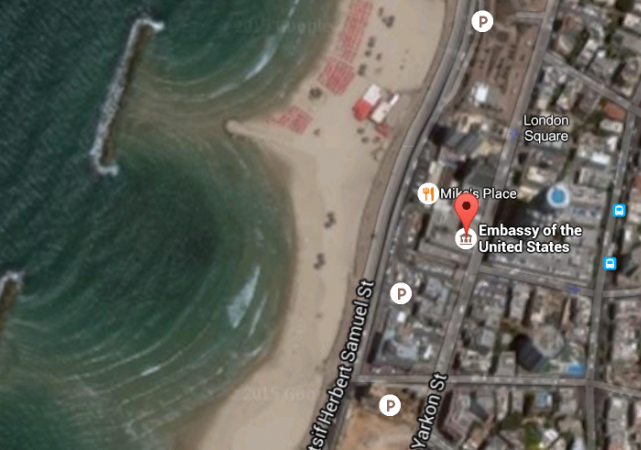
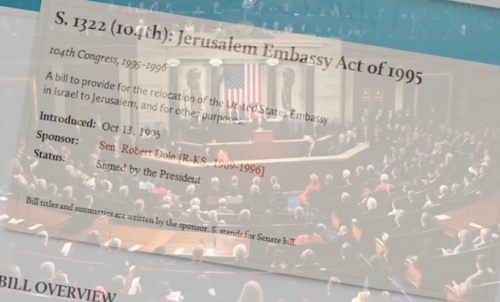
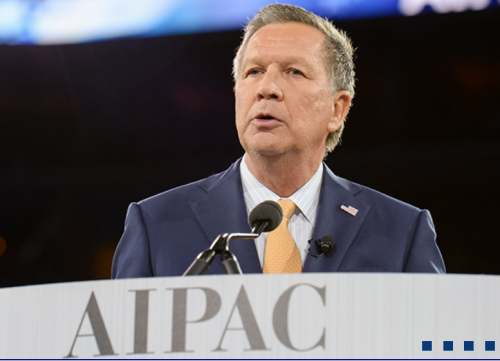
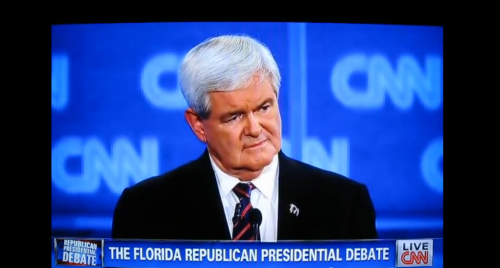
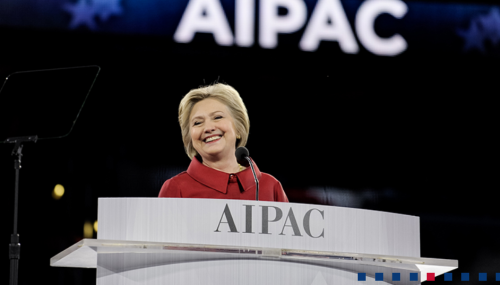
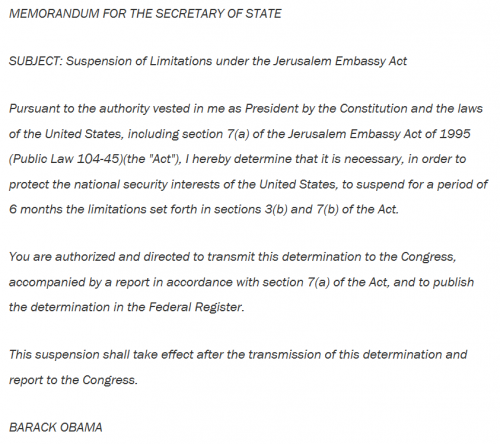











Comments
Half of everything Cruz is promising he seems to also promise will happen day 1. And Trump seems to give lip service to things and eventually change his mind. Funny how the two “outsiders” are perhaps award-winning politi-speak types. Rhetoric and flourishes they may never even intend to act on.
But moving the embassy would probably have to be followed at some point with “carpet bombing” if the Palestinian sympathizers react as anticipated.
Being able to do things “on day one” is an advantage of having 71 calendar days between the date of the election and the date of the inauguration. While there’s a lot of other stuff that has to go on in that period of time, there’s also a lot of direction and pre-planning that can be undertaken.
That means that on day one a President Cruz basically needs to spend a hour signing documents in order to “activate” those pre-planned items (such as moving the embassy, revoking the Iranian nuclear deal, revoking illegal Obama Executive Orders, Requesting Obamacare be repealed by the Congress, etc…).
It does not mean that all of those things will be accomplished on day one (those things within the President’s direct control notwithstanding, such as the EOs noted above being revoked).
This is a campaign promise that I would expect a President Cruz to keep without fail. Cruz has been a routine and strong supporter of Israel.
It’s also the kind of promise that his base would expect him to keep, and it would be the kind of thing that would put the Middle-East on notice that a Cruz Administration would no longer tolerate the type of shenanigans that the Squatters in Gaza and the so called “palestinian authority” (lower case intended) have engaged in.
Cruz understands that you don’t win by negotiation with terrorists. You win by killing them.
A President Trump I would give a 50-50 chance of keeping this promise. I have much less faith that Trump at this point actually understands the minutiae of the conflict, and I can entirely see Trump using the shifting of the Embassy as a negotiation tactic against the pa as a threat, and withdrawing it if the pa sends someone to “negotiate” (even though everybody with half a brain knows that the “negotiation” will be “No. We refuse. Goodbye.” and then back to the current stalemate).
On the other hand, Trump does understand power negotiations, and projecting the embassy into Jerusalem will cause an incitement in the pa leadership, and possibly cause them to do something stupid, which would then allow the Knesset to finally authorize the Israeli Army to actually stomp on them. I would like nothing better than to see Saeb Erekat on his knees publicly begging a President Trump not to send military reinforcements to Israel to root out the Hamas terrorists in Gaza at the Knesset’s request.
I don’t know that Trump knows enough about the history to know that negotiations will fail because the pa won’t negotiate in good faith (at least initially). But I think that Trump is smart enough to figure out that if negotiations fail who to blame, and to actually DO something about it that will make the pa and hamas VERY unhappy.
Chuck: good response, and I agree–of any of them, Cruz is the most likely to honor the campaign pledge. He’s already initiated legislation to revoke the waiver, so has shown not only that this is an issue of great importance to him personally but also that he opposes White House efforts to circumvent the law. It would be a difficult backtrack to renege.
I expect Trump to negotiate a YUGE deal … and the Saudi’s to pay
for the move/s
not sure either can win … scorched earth and all ….
and Hillary will leave everything as it …
It would be more important for the United States to recognize Jerusalem as the capital of Israel.
This is a good point. The Jerusalem Embassy Act of 1995 made it U.S. law to recognize Jerusalem as the capital of Israel. The waiver provision in fact ONLY applies to moving the embassy, it DOES not apply to recognizing a united Jerusalem as the capital of Israel. (Back when Clinton was president, a group of 80 Senators signed a letter addressed to him on exactly that point).
The State Department under the Obama administration has taken this non-compliance with U.S. law one step further because it doesn’t recognize even Jerusalem’s western part (Jewish side) as part of Israel and has said that ALL of Jerusalem is a final status issue up for negotiations.
So basically this stance on the city amounts to saying that even Israel within its 1949 borders is not recognized by the Obama White House.
It’s true that the waiver provision does not apply to the recognition of Jerusalem as part of Israel and its capital. It’s also true that that clause is blatantly unconstitutional, and therefore the State Department is not in “non-compliance with U.S. law”. There is no question that foreign policy is inherently in the president’s prerogative, and the congress is not entitled to a say in the matter. In the recent Zivitofsky case his lawyers didn’t dispute this; their entire case was that putting “Israel” in a passport did not constitute recognition, and therefore congress could force the president to do so. The only way to get the USA to recognise Jerusalem for what it is, is to elect a president who believes in the reality. That would be Cruz.
And it’s not the 0bama White House that doesn’t recognise Israel within its 1949 borders. This has been the policy of every US administration since 1949, including Reagan’s. They have all pretended that the 1947 partition proposal is still on the table, and that Jerusalem is therefore not part of Israel. Again, the only way to reverse this is to elect a president who actually believes and understands that a proposal rejected 69 years ago is no longer valid, no longer acceptable, and it’s time for the USA to rejoin the real world.
As for the effect moving the embassy could have on any potential peace process, it would have this effect: it would bring home to the Arabs the fact that they will never regain control over any part of Jerusalem. So long as the international embassies are in Tel Aviv, the Arabs are encouraged to believe that if they only try hard enough and insist hard enough on this issue they may prevail. The world appears to agree with them, or at least not to rule their position out. Every time the USA says that Jerusalem’s status is not yet determined, and might change as a result of negotiation, it reinforces this delusion. Moving the embassy would say to them “Enough; Jerusalem is going to remain permanently part of Israel, and you can forget about it, so start thinking about what you might ask for instead.”
Another argument that has been raised against moving the embassy immediately is a practical one: the proposed new embassy has not yet been built, and will cost a fortune that we don’t have. However, moving the embassy doesn’t require any construction, or any expense beyond a few thousand dollars for printing stationery and replacing signs. The USA has two — count them, two — consulates in Jerusalem. All President Cruz has to do is issue an executive order designating one of them as the embassy, and the current embassy in Tel Aviv as a consulate. Nobody has to actually move.
In fact, if I were president I would close one of the Jerusalem consulates. In what other city do we have two of these? I’m not sure which one to close, but keeping them both open is a relic of a divided Jerusalem that will never again exist. We don’t have two consulates in Berlin, do we?